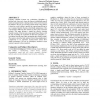19 search results - page 2 / 4 » A computational theory of adaptive behavior based on an evol... |
ATAL
2010
Springer
13 years 7 months ago
2010
Springer
Multi-agent learning is a crucial method to control or find solutions for systems, in which more than one entity needs to be adaptive. In today's interconnected world, such s...
IWCLS
2007
Springer
14 years 12 days ago
2007
Springer
Learning Classifier Systems use evolutionary algorithms to facilitate rule- discovery, where rule fitness is traditionally payoff based and assigned under a sharing scheme. Most c...
ATAL
2005
Springer
13 years 11 months ago
2005
Springer
In the design of resource bounded agents, high-level cognitive activities, such as reasoning, raise important problems related both to the adaptive ability and to the computationa...
NIPS
2008
13 years 7 months ago
2008
Research in animal learning and behavioral neuroscience has distinguished between two forms of action control: a habit-based form, which relies on stored action values, and a goal...
AAMAS
2005
Springer
13 years 6 months ago
2005
Springer
Cooperative multi-agent systems are ones in which several agents attempt, through their interaction, to jointly solve tasks or to maximize utility. Due to the interactions among t...

